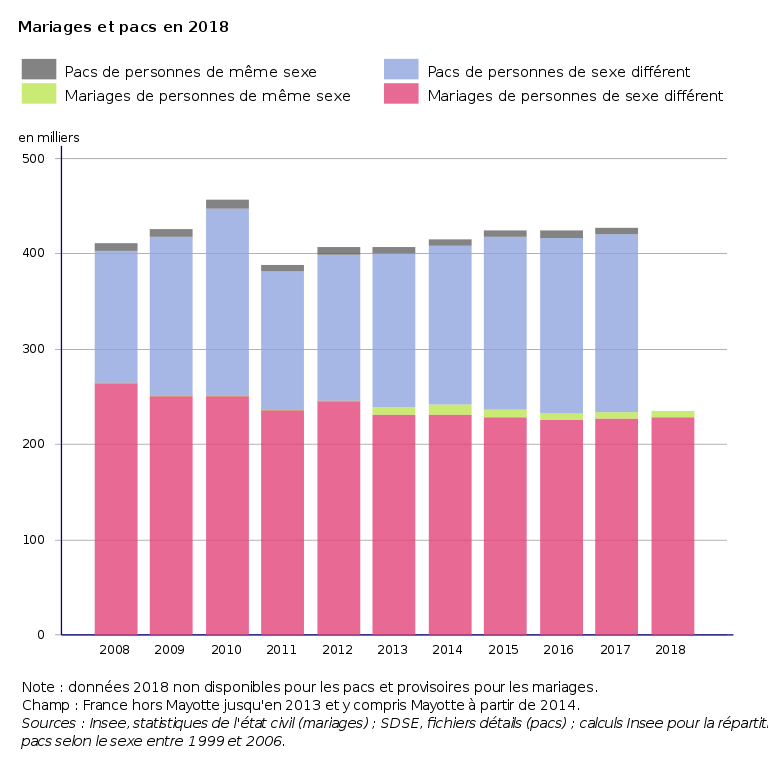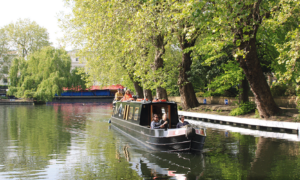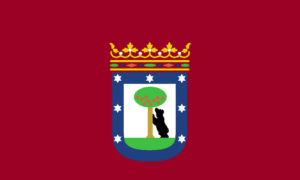The first time I heard about a PACS was a few months after I moved to France. A new French friend had said he was busy the whole weekend — his friends were getting PACSed and they’d be celebrating through Sunday night. Deciphering his text message involved looking up PACS in the dictionary, and I formulated a response with only a vague understanding of why an acronym warranted two days of partying.
In the years since, I have gotten PACSed and explained what it is (hint: not a marriage) countless times to American friends and family. Since we don’t have the equivalent status in the United States, I’ll do my best to explain without getting swamped in French specificities.
A PACS? A … what?
A PACS (pacte civil de solidarité) is a type of French civil union, which unites two people of the same or opposite sex in a shared life or vie commune. Although its statutes are flexible according to the couple’s wishes, a PACS has implications in terms of financial support, housing, taxes, and government benefits.
Author’s note: Marriage is the other type of civil union available to couples in France.
A PACS is only available to couples who are living together, and you must swear to share the same residence as part of the process.
Once you’re PACSed, you’re considered a household or foyer fiscal when you’re paying taxes or applying for government benefits such as unemployment (chomage) and health insurance (assurance maladie). You can also choose to contribute a monthly amount to the household, and you’re financially responsible for any debts incurred by your partner. While many couples sign the convention-type of PACS provided by the government, there is also an option to write your own PACS statutes, though these must be verified by the mayor’s office before your application is approved.
Unlike in marriage, a PACS can be dissolved by its two parties. It doesn’t come with hereditary rights if your partner passes away without specifying an heir, and it isn’t recognized internationally.
In short, a PACS has some of the benefits of marriage without many of the legal implications.
A brief history for context
In October 1999, the PACS was approved by the French parliament as an alternative marriage for same-sex couples. Their aim was to offer them some of the rights provided by marriage, since that legal status was not available to them. Same-sex marriages and adoption rights were made legal in France in May 2013. This means that both same-sex and opposite-sex couples have the right to be married or PACSed.
Okay, so a PACS is ….
A PACS is a type of civil union, though remember, so is marriage. In the United States, we use often misuse the term “civil union” to mean something roughly equivalent to a PACS. A PACS is a legal status, but only in the EU. On French government forms, there is the option to mark PACSé and you may be eligible for visa vie privée et familial based on that status. However, since the United States doesn’t recognize a PACS, I’m considered “single” there, and my partner wouldn’t be allowed to immigrate on the grounds of our PACS alone.
What a PACS is not…
A PACS is not a marriage. A marriage brings more legal rights and responsibilities, especially in terms of financial support and shared estates. It also requires a lawyer to annul or execute a divorce while a PACS can be dissolved by its two partners.
A PACS is not a civil marriage or mariage civile. This is the ceremony conducted at the mayor’s office by a public official. In France, your marriage must be registered with the state before you have your mariage religieux, which follows religious conventions. A PACS is also not that. A PACS is not a common-law marriage. This term applies to “marriages” which are not legally recognized but which two parties have engaged by their own definition, outside of a legal frame work.
Fun fact: Common-law marriage is often misused as synonym for civil union, which is in fact legally recognized.
A PACS is not a co-habitation or concubinage. This is a union where a couple is acknowledge as
living together, but it doesn’t have any associated rights.

So why get PACSed?
Although it is as easy to write off a PACS as a bureaucratic marriage, to many French couples it is just as serious and warrants a week-end long celebration. Although there is always the option to have only a mariage civile, a PACS is one step further away from the institution of the church and its definition of marriage. Also, its tenants are more customizable than a marriage which can be part of its appeal.
In my case, my partner and I were both ready to take a step that made our relationship more official. And, as an American, being PACSed gave me a more stable immigration track and an option to have a working visa.
How do I explain this to my American parents?
The short answer: I sent them the link to Wikipedia and called it a civil union. The longer answer: I explained that my partner and I were taking a step forward in our relationship. Rather than getting married, we were choosing to get PACSed as a way of showing our commitment to each other and to my future in France.
All of the above didn’t stop my grandmother from referring to my partner as my husband and sending me mail as though I’d taken his last name.
Bonus: So what do I call my PACSé?
The easiest (and least sexy) is to say, mon pacsé (if referring to a male), ma pacsée (if referring to a female), or les pacsés (for the couple as a whole). It seems very un-romantic to refer to someone by an acronym and I don’t use this term unless we’re together at the Prefecture of Police for a visa appointment.
In French the word partner, partenaire, is more often used in business settings although it can also be used to refer to your pacsé. I’ve settled on compagnon which translates to both companion and partner.
But as with many things PACS related … you get to make the rules.
Wondering about How to Get PACSed? Here’s another post about how to do just that.
––––––––––
Gracie Bialecki is a writer and literary coach based in Paris, France. Her work has appeared in various publications, including Catapult and Epiphany Magazine where she was a monthly columnist. Bialecki is co-founder of Thirst, a gallery and storytelling series; a poetry editor at Paris Lit Up; and the author of the novel Purple Gold (ANTIBOOKCLUB).















